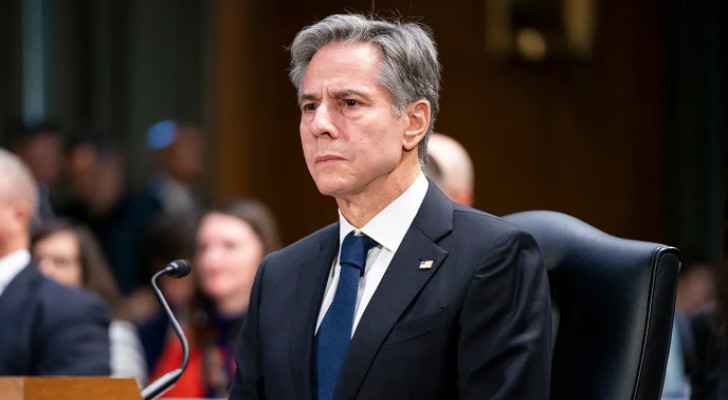This election deepened America's tribal divide - By James J. Zogby, The Jordan Times
This election was the meanest, dirtiest and most disgraceful in my lifetime, and it will have consequences. Even before the results began to be reported on late Tuesday night, we already knew who the losers were going to be; the American people and our political culture. The damage done by President Donald Trump's divisive rhetoric will be with us for a generation.
While Trump's advisers had urged him to focus on the good news about the economy during the last few weeks of the election, he opted instead to preach a message of fear. His target was the "caravan" of refugees coming northward from Guatemala, hoping to find refuge from the violence and poverty of their homeland.
Reporters covering the rag-tag group of refugees found them largely to be mothers with their children and boys and girls in their early teens. In Trump's speeches, however, they became more ominous "dangerous violent gang-members" with some "Middle Easterners" thrown in for good measure. They were "invaders" and the effort to enter our country was portrayed as an act of war. And so the president announced that he was sending troops to protect the border. As he continued to hype the threat posed by the "invasion", the number of troops being sent increased from 2,000 to 5,000 to 15,000.
For three weeks Trump crisscrossed the country, speaking in rally after rally to mobilise his supporters to vote for Republican candidates. He warned of dire consequences if the Democrats won: He might be impeached, the country would be overrun by dangerous immigrants, the economy would collapse — despite the fact that the recovery and massive job creation began during former president Barack Obama's term — and we would be less safe and taxed more. And by the way, should Democrats win, they will act violently against those who oppose them. The central message was always fear.
To drive this home, Trump's team produced a TV ad that featured a frightening foul-mouthed rant by a convicted serial killer who committed his crimes while in the US illegally. The ad continued with footage of Latin Americans storming an unidentified fence. The message was clear: "These are the violent people Democrats want to let into our country. Be afraid, very afraid."
The problem with the ad was that the killer in question had been deported by former president Bill Clinton, and had stolen his way back into the country and committed his crimes during George W. Bush administration. It was not the dishonesty of the ad, however, it was its overt racist appeal that caused the networks, including Trump's favourite Fox News, to refuse to run it. Media executives called the ad the "most racist ad ever put forward by a campaign".
To some extent, the appeal to fear worked. Despite some of the more bizarre and flagrantly distorted claims that Trump made during his post-election press conference, that people really like him, the election was a victory of historic proportions, that his polling numbers among black voters are great, etc., one observation that he made was true. His intervention during the last few weeks of the campaign did make a difference in boosting a few Republicans to victory.
Until Trump's tour, the energy of this election was on the Democratic side. Trump's appeal to fear and his dire warnings about the country being overrun by dangerous foreigners, and the violence and economic disaster that would accompany a Democratic victory, succeeded in energising Republican voters. But it did so at a cost to our democracy.
The final results of this election are still somewhat uncertain, as there are a few key races that are too close to call. Despite that, as it stands right now, it is clear that Democrats did well. They flipped the Congress from 235 Republicans and 193 Democrats to a Democratic-controlled body with 230 Democrats and 205 Republicans. Seven governorships changed from Republican to Democrat. And in down-ballot state legislative contests, Democrats added almost 300 seats to their ranks. Only in the US Senate, did the Republicans make slight gains, possibly adding two to their ranks.
Beyond the vote tallies and the final determination of who won and lost, my concern is that after two years of Trump and his behaviour in the final weeks of the campaign, the country is more polarised than ever. Looking at election day exit polls, what comes through is that while there are issue differences that separate Republicans and Democrats, more to the point are the splits between the two parties that appear to be driven more by demographics than by ideas.
On the Democratic side are young people, the college educated — especially women — and minority communities. Voting Republican are middle-aged, less educated working-class whites, gun owners and white "born-again Christians". It is as if we have become two distinct tribes at war.
In fairness, the attacks in this war have been largely coming from one side. For decades now, Republicans have directed their messaging to white voters by stoking fears of blacks, Latinos, Muslims and Arabs. They have issued ominous warnings about drugs and crime, violence and immigration using code words to associate all of these with the above mentioned groups.
In response, Democrats have pushed back defending the groups under attack, mobilising them to vote for Democrats and offering reasoned policy prescriptions to address the issues. What Democrats have not done is develop a sustained national outreach campaign directed at the white working-class voters courted by Trump and the GOP. By abandoning them and focusing, at times almost exclusively on "their voters", Democrats have left the white working class to Trump, indirectly contributing to the tribal war that defines our political culture.
Because I have no hope that in its current incarnation, we can expect the GOP to change, it is incumbent on Democrats to work to bridge the divides that have become so pronounced in the era of Trump. They will not have to stop doing anything. They will only need to pay attention to a substantial group of voters, whose economic and cultural insecurity and fear of the "other" have been exploited by Republicans. Not only will this "politics of addition" help Democrats win more elections, it will also contribute to healing the divide and making America governable again.
Latest News
 Israeli Occupation strike inside Iran responds to Tehran's provocation, reports say
Israeli Occupation strike inside Iran responds to Tehran's provocation, reports say Blinken highlights urgency for enhanced humanitarian aid in Gaza Strip
Blinken highlights urgency for enhanced humanitarian aid in Gaza Strip Senate president, British ambassador discuss strategic partnership, regional stability
Senate president, British ambassador discuss strategic partnership, regional stability Jordan urges UN to recognise Palestine as state
Jordan urges UN to recognise Palestine as state Safadi, Iranian counterpart discuss war on Gaza, regional escalation
Safadi, Iranian counterpart discuss war on Gaza, regional escalation
Most Read Articles
- Jordan urges UN to recognise Palestine as state
- Senate president, British ambassador discuss strategic partnership, regional stability
- JAF carries out seven more airdrops of aid into Gaza
- Temperatures to near 40 degree mark next week in Jordan
- Safadi, Iranian counterpart discuss war on Gaza, regional escalation
- US vetoes Security Council resolution on full Palestinian UN membership
- UN chief warns Mideast on brink of ‘full-scale regional conflict’
- Biden urges Congress to pass 'pivotal' Ukraine, Israel war aid
- Google fires 28 employees for protesting $1.2 billion cloud deal with “Israeli” army
- Israeli Occupation strike inside Iran responds to Tehran's provocation, reports say